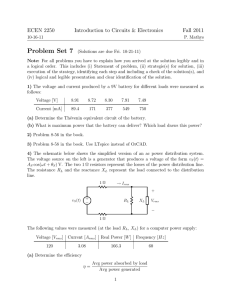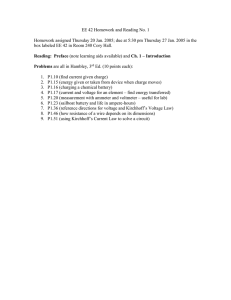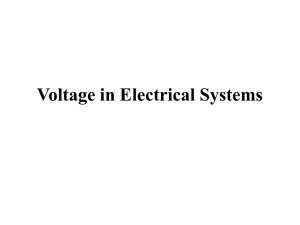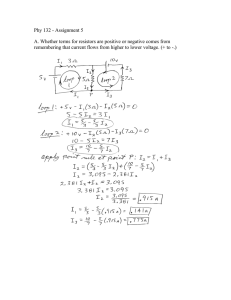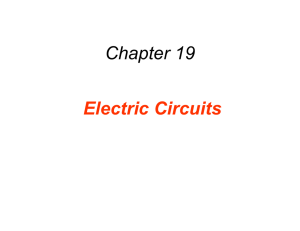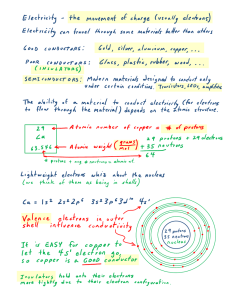20.7 Parallel Wiring
advertisement
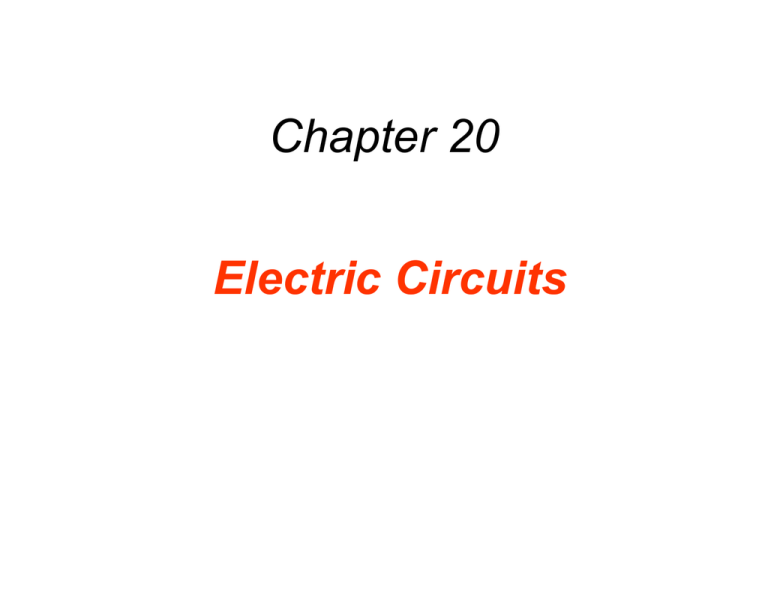
Chapter 20 Electric Circuits 20.7 Parallel Wiring Parallel wiring means that the devices are connected in such a way that the same voltage is applied across each device. When two resistors are connected in parallel, each receives current from the battery as if the other were not present. Therefore the two resistors connected in parallel draw more current than does either resistor alone. 20.7 Parallel Wiring Household outlets are connected in parallel instead of series so that each appliance sees the same voltage; also, if one appliance blows out, power is not cut to all appliances. 20.7 Parallel Wiring Derivation of the parallel resistor formula: Since R1 and R2 are connected in parallel, they have the same voltage across them, V, so &1 & 1 # V V 1 # I = I1 + I 2 = + = V $$ + !! = V $$ !! R1 R2 % R1 R2 " % RP " parallel resistors 1 1 1 1 = + + + RP R1 R2 R3 20.7 Parallel Wiring Example 10 Main and Remote Stereo Speakers Most receivers allow the user to connect to “remote” speakers in addition to the main speakers. The average (rms) voltage across the speakers is 6.00 V. Determine (a) the equivalent resistance of the two speakers, (b) the total current supplied by the receiver, (c) the current in each speaker, and (d) the power dissipated in each speaker. 20.7 Parallel Wiring (a) (b) 1 1 1 3 = + = RP 8.00 Ω 4.00 Ω 8.00 Ω I rms Vrms 6.00 V = = = 2.25 A RP 2.67 Ω è RP = 2.67 Ω 20.7 Parallel Wiring (c) R1: I rms = Vrms 6.00 V = = 0.750 A R 8.00 Ω R2: I rms = Vrms 6.00 V = = 1.50 A R 4.00 Ω Itot = 0.750 A + 1.50 A = 2.25 A, as in part (b) (d) R1: P = I rmsVrms = (0.750 A )(6.00 V ) = 4.50 W R2: P = I rmsVrms = (1.50 A )(6.00 V ) = 9.00 W è Ptot = 4.50 W + 9.00 W = 13.5 W Alternatively, Ptot = ItotV = (2.25)(6.00) = 13.5 W 20.7 Parallel Wiring Conceptual Example 11 A Three-Way Light Bulb and Parallel Wiring Within the bulb there are two separate filaments. When one burns out, the bulb can produce only one level of illumination, but not the highest. Are the filaments connected in series or parallel? --> parallel; Find the filament resistances: Since P = V2/R --> R=V2/P R100W = (120 V)2/(100 W) = 144 Ω R50W = (120 V)2/(50 W) = 288 Ω How can two filaments be used to produce three different illumination levels? 1) A on, B off --> 50 W output 2) A off, B on --> 100 W output 3) A on, B on --> 50 W + 100 W = 150 W output Example. The figure shows a circuit composed of a 24-V battery and four resistors, whose resistances are 110, 180, 220 and 250 Ω. Find (a) the total current supplied by the battery and (b) the voltage between points A and B in the circuit. Series R = R1 + R2 and Parallel 1/R = 1/R1 + 1/R2 20.8 Circuits Wired Partially in Series and Partially in Parallel Series: R = 220 Ω + 250 Ω = 470 Ω Parallel: 1/R = 1/(180 Ω) + 1/(470 Ω) R = 130 Ω Series: R = 110 Ω + 130 Ω = 240 Ω Example -- continued (a) Total current supplied by battery: I = V/R , V = 24 V, R = 240 Ω (equivalent resistance of the circuit) è I = 24/240 = 0.10 A (b) Voltage between points A and B: VAB = IRAB = (0.10)(130) = 13 V 20.9 Internal Resistance Batteries and generators add some resistance to a circuit. This resistance is called internal resistance. The actual voltage between the terminals of a battery is known as the terminal voltage. 20.9 Internal Resistance Example 12 The Terminal Voltage of a Battery The car battery has an emf of 12.0 V and an internal resistance of 0.0100 Ω. What is the terminal voltage when the current drawn from the battery is (a) 10.0 A and (b) 100.0 A? (a) V = Ir = (10.0 A )(0.010 Ω ) = 0.10 V 12.0 V − 0.10 V = 11.9V (b) V = Ir = (100.0 A )(0.010 Ω ) = 1.0 V 12.0 V − 1.0 V = 11.0V Why do your headlights dim when you start up your car? Using the numbers in the previous example: Before turning on the starter switch, I1 = 0 A, I = I2 = 10 A and VAB = 11.9 V as in part (a). After turning on the starter switch, a large current flows through I1 so I = 100 A and VAB = 11.0 V as in part (b). Since the headlights see a reduced VAB, they dim. ( Pheadlights = VAB2/R2 ) headlights A B starter r = 0.010 Ω 12 V
